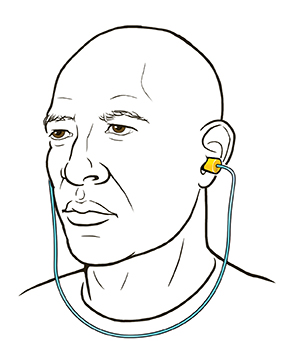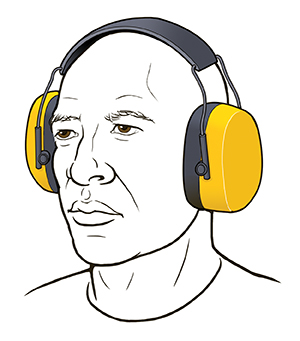A
B
C
D
E
F
G
H
I
J
K
L
M
N
O
P
Q
R
S
T
U
V
W
X
Y
Z
Topic IndexLibrary Index
Click a letter to see a list of conditions beginning with that letter.
Click 'Topic Index' to return to the index for the current topic.
Click 'Library Index' to return to the listing of all topics.
Choices for Hearing Protection
Earplugs and earmuffs can protect you from hearing damage. They have a noise reduction rating (NRR). The NRR tells you how many decibels (dBA) of noise they will block.
Noise levels at or above 85 decibels can damage hearing. Check the NRR and decide what protection is right for you. Earplugs and earmuffs can be worn together. This will block even more noise.
Earplugs
Earplugs are small pellets that fit in your ear. They:
-
Are made of dense foam, flexible rubber, or silicone.
-
Come in different shapes.
-
May be custom made.
-
May be joined by a cord to prevent loss.
-
Are lightweight, comfortable, and easy to fit.

Putting in earplugs
-
Wash your hands first.
-
Roll the earplug until it's a thin cylinder on one end.
-
Reach over your head, pull your ear up and back, and push the earplug into your ear.
-
Hold the earplug in place while it expands to fill your ear canal.
Caring for earplugs
Earmuffs
Earmuffs look like wireless headphones. They:

Putting on earmuffs
-
Push your hair away from your ears.
-
Place the cushions over your ears.
-
Press the cushions. This creates a seal around your ears.
-
Wear the headband over the top of your head. Don't wear it around your neck.
Caring for earmuffs
-
Wipe the cushions clean with a damp cloth and soap.
-
Do not make changes to the headband or cushions.
-
Replace the cushions if they are torn.
-
Replace the headband if it's bent.
Online Medical Reviewer:
Melinda Murray Ratini DO
Online Medical Reviewer:
Riley Holtz RN BS
Date Last Reviewed:
3/1/2025
© 2000-2025 The StayWell Company, LLC. All rights reserved. This information is not intended as a substitute for professional medical care. Always follow your healthcare professional's instructions.